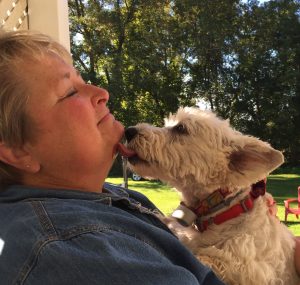Oh he’s sneaky, my husband. I know it, our family knows it, his companions know it, the nurses know it. Sneaky Pete. Sometimes it’s funny, other times not so much. Sometimes his sneakiness has the potential to cause real problems.
A couple weeks ago an innocent mistake triggered his wrath. He was really, really angry. Combative. Luckily a nurse was able to intervene and calm him. My husband has so seldom been truly angry that I could count the times on one hand. This was so not him.
I heard about this after the fact.
At the same time I learned he’d been refusing to take his meds again. This had happened now and then for some time, but as far as I knew the problem had been solved long since. Oh, he appears to take the pills but he pockets them, or tucks them under his tongue or inside his cheek, or simply lays them down somewhere. It is likely that not taking his Wellbutrin for several previous days contributed to his rage.
Residents in memory care units often refuse their meds for fear of being “poisoned.” Or because they’re to hard swallow. One common practice is to put crushed pills in applesauce, or ice cream, Reese’s cups, drinks, pudding, peanut butter, Jello. Those don’t work with Peter, but one nurse who never has a problem with him, puts his evening pills in his doctor-prescribed after dinner Guinness. Works a treat.
Thing is, he likes to tease and he loves the attention he gets when one of the staff realizes he’s tricked them. For all the time I was his caregiver at home, I dealt with his refusal to take pills by donning my “Mother Tough” persona, my left eyebrow on alert. I’d stand beside him and, to make sure he swallowed them, I’d tell him to hold both hands out palms up, then pull his pockets inside out, and finally open his mouth. I wasn’t bound by HIPAA rules that say a patient can’t be forced to take medications if he/she doesn’t want to. Medical personnel cannot force meds on a patient. If the patient says no, that’s it.
That’s just wrong. If refusing a medication were to cause the patient to become markedly worse—or perhaps cause their death—wouldn’t that be a lawsuit waiting to happen?
This morning I popped in for a quick visit between an appointment and several errands. Involved story, but when Peter searched his pockets he “found” his morning pills. A helper and I noticed at the same time. “Peter,” we yelped in unison, “you’re supposed to take those pills, not carry them around!”
His silly “who me?” face said he’d achieved his goal. He’d been noticed. He protested all the way through the building to his room and, no, I didn’t drag him by the ear, but I wanted to. In no uncertain terms I told him to put the pills in his mouth and drink them down with the cup of water I handed him. He complained and said they tasted awful. “You’re not supposed to chew them!” I said. “Of course they taste awful. Take a big drink and swallow them.”
I know, I know, I should’ve handled it better. But, doggone it, he doesn’t remember why he’s in memory care nor why he must take various medications, but he does remember how to get a rise out of me and anyone else who tries to help him.
It really isn’t a laughing matter.
Header photo: Jersey Urology.com
2016 National Society of Newspaper Columnists’ contest finalist. 


























